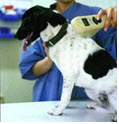Dogs are one of the UK’S most popular pets and come in all shapes and sizes. In order to care for your dog in the best way, you need to consider the following things before bringing a dog into your family.
Vaccinations
Puppies- These are initially given as a course. Your puppy will need one injection at 8 weeks of age and another injection at 10 weeks of age. They will then require yearly boosters to keep their immunity against diseases.
Adult dogs/senior dogs that are already vaccinated- If you are rehoming a dog that has already been vaccinated then they will not require the initial course, however they do still need the yearly boosters to protect them. You should be provided with a vaccine certificate that will tell you when the next booster is due.
Vaccinations protect your pet against fatal diseases such as; parvovirus, distemper, hepatitis, leptospirosis, enteritis and parainfluenza.
The vaccines are rotated every year so that your dog is only vaccinated against all of the viruses once every 3 years. They will receive a ‘mini’ booster in the interim 2 years.
 Microchipping
Microchipping
Microchipping is a fantastic way to help your dog find its way home if they were even to go missing.
A microchip is a little magnet, about the size of a grain of rice, which is implanted into the back of your dog’s neck in between their shoulder blades. When read by a chip reader, a barcode will be picked up that is unique to your dog. All the details for your dog will be stored in a database, so contacting the company and giving the unique barcode number will re unite you with your dog.
A dog can be microchiped at any age.
Insurance
Due to rising costs of veterinary care, Insurance is a must have. Unfortunately there is no NHS for animals and therefore all treatment received must be paid for at time of treatment. If you have pet insurance this can then be claimed back in full, depending on your policy.
There are many different policies around and it is important to read the small print before purchasing any policy. When renewing your policies it is important to remember that if you have previously claimed for a ongoing condition with another company this will then not be covered by any new company you insure with. E.g. if your dog has been diagnosed with diabetes with insurance company A and you then change to insurance company B after the first year this may then not be covered as it is a pre existing condition.
If you would like any more information on this please pop into the surgery for an information pack or to talk to any member of our team.
Neutering
If you are not going to be breeding from your dog then neutering is highly recommended. It stops any unwanted pregnancies and also protects your dog from reproductive health problems in the future.
Castration- This is the neutering of a male dog and is when the testicles are removed. This should prevent your dog from marking their territory and humping their toys. This will not happen straight away as it will take a couple of months for the hormones to be suppressed. It can be done from 6 months of age, however if your dog is not causing any problems we would recommend to wait until they are around 1 year old.
Spaying- This is the neutering of a female dog and is the complete removal of her ovaries and uterus. Female dogs do NOT need to have a litter before they can be spayed. They can be spayed 2 months after their first season. This can be anywhere from 6-18 months of age. If you are getting an older dog that is un-neutered they can also be done 2 months after their last season.
Diet
Dog diets need to be tailored to suit your dogs needs (life stage, prescription diets and breed).
Puppies- Puppies should be weaned onto hard foods from 6 weeks of age. They will then need to stay on a puppy/junior diet until they are around 1 year old depending on the breed/size of your dog. It needs to be a complete food to ensure they are getting all the required vitamins. Deficiencies in certain types of vitamins can cause skeletal diseases (rickets).
Adults/ Neutered dogs- Adult dogs should be on a complete Adult diet. If you pet is neutered, there are neutered diets available that are tailored to their calorie needs as neutering will slow their metabolism down which can lead to excessive weight gain if not given the correct diet.
Mature/senior pets- It is important that older dogs are given a specific senior diet as it will contain certain vitamins and minerals to help with things such as brain function, joint maintenance and general age related health problems. Generally dogs should be given a senior/mature diet from the age of 7 however in larger breed dogs it should be considered from the age of 5/6.
We would advise that dry food is given throughout the life stages for oral hygiene unless otherwise suggested.
Parasite Control
We recommend that your pet is treated regularly for internal and external parasites (worms and fleas).
Worms- Puppies need to be wormed every month for the rest of their lives. Lungworm aware
Tablets can be purchased from your vets and will go on the weight of your dog so regular weight checks are ideal. You can pop into the surgery at any time to weigh your dog.
 Fleas- Most dogs will get fleas at some point in their lives, and are most common in the summer months, although are around throughout the year. Regular 2 monthly treatments are required. This is done with a spot on treatment that goes onto the back of the neck directly on the skin. Depending on the brand it can also be available in a spray.
Fleas- Most dogs will get fleas at some point in their lives, and are most common in the summer months, although are around throughout the year. Regular 2 monthly treatments are required. This is done with a spot on treatment that goes onto the back of the neck directly on the skin. Depending on the brand it can also be available in a spray.
It is also important to regularly treat the house with a household flea spray, which should ideally be done once a year.